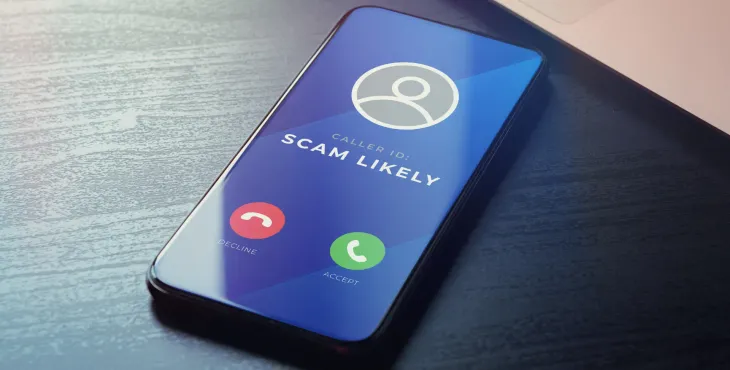
Mobile Phone Upgrade Scam: What You Need To Know To Stay Safe
In today's digital age, mobile phones have become an essential part of our daily lives. With technology advancing at a rapid pace, many of us are tempted to upgrade our phones frequently to stay up-to-date with the latest features and capabilities. However, with this growing demand for new mobile devices, there has been an increase in mobile phone upgrade scams. These scams can be very convincing, often using tactics that make them difficult to spot.
During the initial six months of 2022, identity fraud on telecoms products escalated by a remarkable 17% compared to 2021 figures! This type of crime is chiefly aimed towards individuals aged between 31 and 50 years old.
It's essential to be aware of these scams, as falling victim to one can have serious financial consequences. In this article, we'll explain what mobile phone upgrade scams are, how they work, and most importantly, how you can protect yourself from them.
What does a typical conversation look like for callers to a mobile phone fraud?

Typically, the phone call or conversation in a mobile phone upgrade scam begins with the scammer offering a "special" upgrade deal. They may claim to be a representative of a legitimate phone company (usually your mobile network provider) or third-party reseller and offer a device upgrade at a significantly reduced cost or with additional benefits such as free accessories or a waived activation fee.
The scammer may then use high-pressure sales tactics to encourage you to act quickly and provide personal and financial information to secure the offer. They may also claim that the offer is time-sensitive or that there are limited quantities available. In some cases, scammers may even use fear tactics, such as threatening to cancel your phone service or charging you additional fees if you don't act quickly. It's important to be wary of these tactics and to always verify the legitimacy of any upgrade offer before providing any information.
What other ways can scammers contact you?

Scammers may also use phishing techniques, such as fake websites or emails that appear to be from legitimate companies, to trick victims into providing sensitive information.
In some cases, scammers may even send fake invoices or bills that appear to be from your phone company to further convince you that the offer is legitimate.
These scams can be executed via phone calls, emails, text messages, or even social media. It's essential to remain vigilant and to always verify the legitimacy of any upgrade offer before providing any personal details or financial information.
Signs that a mobile phone upgrade offer is a scam

When considering a mobile phone upgrade offer, there are several red flags and warning signs to look out for that may indicate the offer is a scam.
1. One of the most significant warning signs is if the offer seems too good to be true. Scammers often use this tactic to lure victims into providing personal and financial information.
2. Another red flag is if the caller or representative is pressuring you to act quickly and provide sensitive information. Legitimate companies typically do not use these high-pressure sales tactics.
3. You should also be wary of offers that require upfront payments or deposits before you receive the device.
4. If the caller or representative is unable to provide clear and detailed information about the upgrade offer, it's likely a scam.
5. Finally, be cautious of offers that are received via unsolicited phone calls, emails, or text messages. Legitimate companies typically do not reach out to customers in this way.
If you encounter any of these red flags or warning signs, it's essential to verify the legitimacy of the offer before providing any personal or financial information.
Tips for staying safe and avoiding falling victim to these scam

Mobile phone upgrade scams are becoming more sophisticated and difficult to detect. However, there are several steps you can take to protect yourself from these scams and avoid falling victim to them.
First, it's important to be aware of the warning signs and red flags of mobile phone upgrade scams. As mentioned earlier, if the offer seems too good to be true, the caller or representative is pressuring you to act quickly, or if they're unable to provide clear and detailed information about the offer, it's likely a scam. You should also be cautious of offers received via unsolicited phone calls, emails, or text messages.
To stay safe, it's essential to verify the legitimacy of any upgrade offer before providing any personal or financial information. You can do this by contacting your phone company directly to check if you are legitimate for the new mobile phone or visiting their official website to confirm the details of the offer.
Additionally, it's important to protect your personal and financial information by never providing it to anyone you do not trust or who contacts you unsolicited. Be wary of any requests for passwords, PINs, or other sensitive information.
If you have fallen victim to a mobile phone upgrade scam, it's essential to act quickly. Contact your phone company and financial institution immediately to report the fraud and take steps to protect your accounts. You should also file a report with the Action Fraud and the local police department.
In conclusion, staying vigilant and being aware of the warning signs and red flags of mobile phone upgrade scams is essential to protect yourself from falling victim to these scams. By verifying the legitimacy of any upgrade offer, protecting your personal and financial information, and acting quickly if you have been scammed, you can keep yourself safe and secure.
Conclusion

Mobile phone upgrade scams can be costly and disruptive, but by being aware of the warning signs and taking steps to protect yourself, you can avoid falling victim to them. To recap, some of the key points to keep in mind are:
Mobile phone upgrade scams typically involve high-pressure sales tactics, time-sensitive offers, and requests for personal and banking details.
Red flags to look out for include offers that seem too good to be true, callers who pressure you to act quickly, and requests for upfront payments or deposits.
To protect yourself, it's important to verify the legitimacy of any upgrade offer before providing any information and to never give out sensitive information to anyone you do not trust.
If you have been scammed, it's important to act quickly by contacting your phone company and financial institution, filing a report with the local police, and taking steps to protect your accounts.
In conclusion, mobile phone upgrade scams can be tricky to spot, but by staying vigilant and protecting your personal and financial information, you can avoid falling victim to them. Remember to always verify the legitimacy of any offer and to be cautious of high-pressure sales tactics or unsolicited calls and messages. By taking these steps, you can stay safe and secure while enjoying the benefits of your mobile device.